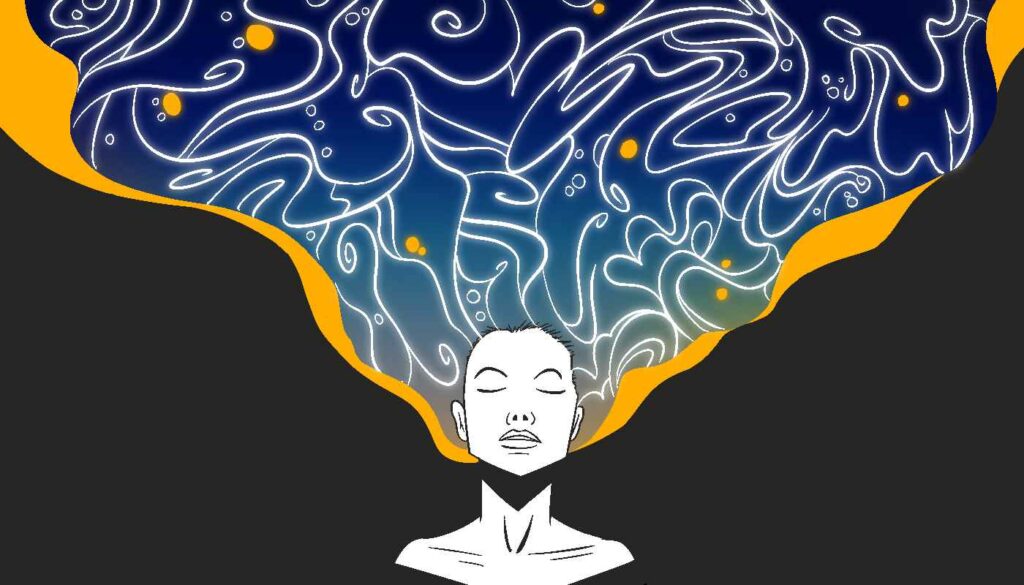Dreams have always been a subject of fascination and intrigue. They are a mysterious manifestation of our unconscious mind, often carrying hidden meanings and messages. For centuries, people have been trying to understand the psychology of dreams and decode their symbolism. In this blog, we will explore the fascinating world of dreams and delve into the psychology behind them.
Contents
What is The Psychology Of Dreams?
 The psychology of dreams refers to the study of the underlying processes, meanings, and functions of dreams. It is a subfield of psychology that aims to understand the cognitive, emotional, and physiological aspects of dreaming and how they relate to our waking lives. Dreams can be seen as a window into the unconscious mind, providing insights into our deepest desires, fears, and motivations. They can also reflect our emotional state, current life events, and past experiences.
The psychology of dreams refers to the study of the underlying processes, meanings, and functions of dreams. It is a subfield of psychology that aims to understand the cognitive, emotional, and physiological aspects of dreaming and how they relate to our waking lives. Dreams can be seen as a window into the unconscious mind, providing insights into our deepest desires, fears, and motivations. They can also reflect our emotional state, current life events, and past experiences.
Psychologists have proposed various theories to explain the psychology of dreams, including the activation-synthesis theory, the cognitive-psychological theory, the psychoanalytic theory, and the neurobiological theory. The study of the psychology of dreams continues to be an important and fascinating area of research. It provides valuable insights into the workings of the human mind and our experiences during sleep.
What Are The Different Concepts?
- Dream Content: This refers to the actual content of a dream, including the images, emotions, and events experienced during sleep.
- Dream Theories: There are various theories that attempt to explain the underlying processes, meanings, and functions of dreams. Some of the most prominent theories include the activation-synthesis theory, the cognitive-psychological theory, the psychoanalytic theory, and the neurobiological theory.
- Dream Interpretation: This refers to the process of trying to understand the symbolic meaning of a dream. Different methods of dream interpretation include traditional symbolic interpretation, cognitive-behavioral interpretation, and psychoanalytic interpretation.
- Lucid Dreaming: This is a type of dream in which the dreamer is aware that they are dreaming and has the ability to control or manipulate the dream content.
- Sleep Stages: Dreams typically occur during the rapid eye movement (REM) stage of sleep, but can also occur during other stages of sleep. Understanding the different stages of sleep and their relationship to dreaming is an important aspect of the psychology of dreams.
- Dream Recall: This refers to the ability to remember and recall dreams after waking up. Some people have better dream recall than others, and factors such as sleep quality and stress levels can impact dream recall.
- Nightmares: These are dreams that cause fear, anxiety, or other negative emotions. Nightmares can be distressing and may be related to underlying psychological or emotional issues.
By exploring these concepts, we can gain a deeper understanding of the psychology of dreams and the role that dreaming plays in our lives.
What Your Dreams Are Telling You?
 Dreams can be thought of as a reflection of our thoughts, feelings, and experiences. While the exact meaning of a dream can be difficult to interpret, there are some common themes and symbols that are found in many dreams. And that can offer insight into what your dreams may be telling you.
Dreams can be thought of as a reflection of our thoughts, feelings, and experiences. While the exact meaning of a dream can be difficult to interpret, there are some common themes and symbols that are found in many dreams. And that can offer insight into what your dreams may be telling you.
For example:
- Repressed emotions: Dreams can sometimes bring to the surface emotions that we have been suppressing during our waking life. For example, if you have been feeling angry or frustrated about a situation, you might dream about expressing that anger in a powerful or aggressive way.
- Unconscious desires: Dreams can also reveal our deepest desires and motivations, such as a desire for love, success, or fulfillment.
- Anxiety and fears: Dreams can also reflect our fears and anxieties, such as fears of failure, abandonment, or danger.
- Life changes and transitions: Dreams can also provide insight into the changes and transitions we are experiencing in our lives. Such as starting a new job, moving to a new home, or experiencing a loss.
- Personal growth and self-discovery: Dreams can also help us to gain greater self-awareness and insight into our own personality and motivations.
It is important to keep in mind that the interpretation of dreams is a complex and subjective process. While some symbols and themes are common across many cultures and traditions, the meaning of a dream can also be highly personal and unique to the individual. Additionally, it is important to consider the context of your life and your current experiences when interpreting your dreams.
What Are The Theories Of The Psychology Of Dreams?
There are several theories in the psychology of dreams that aim to explain the underlying processes and functions of dreaming. Some of the most prominent theories include:
Activation-Synthesis Theory
This theory, proposed by Allan Hobson and Robert McCarley in the 1970s, suggests that dreams are a result of the brain’s attempt to make sense of random neural activity during sleep. According to this theory, dreams are not meaningful in and of themselves. But are rather a byproduct of the brain’s attempts to synthesize and interpret the random firing of neurons during sleep.
Cognitive-Psychological Theory
This theory views dreams as a problem-solving tool, allowing us to process and integrate new information and experiences from our waking life. According to this theory, dreams can help us to work through unresolved problems, and overcome mental blocks. And gain new insights into our thoughts and feelings.
Psychoanalytic Theory
This theory, developed by Sigmund Freud, views dreams as a manifestation of unconscious desires and conflicts. According to this theory, dreams can reveal hidden aspects of our personality and unconscious mind, and provide insight into our deepest fears and desires.
Neurobiological Theory
This theory suggests that dreaming is a result of the brain’s attempts to consolidate memories and regulate emotions. According to this theory, the brain uses the process of dreaming to strengthen and integrate new memories, regulate emotions, and promote overall neural health.
Each of these theories offers a different perspective on the psychology of dreams and provides valuable insights into the underlying processes and functions of dreaming. While no single theory can fully explain the complexity of dreaming, a combination of these and other theories can provide a more comprehensive understanding of the psychology of dreams.



